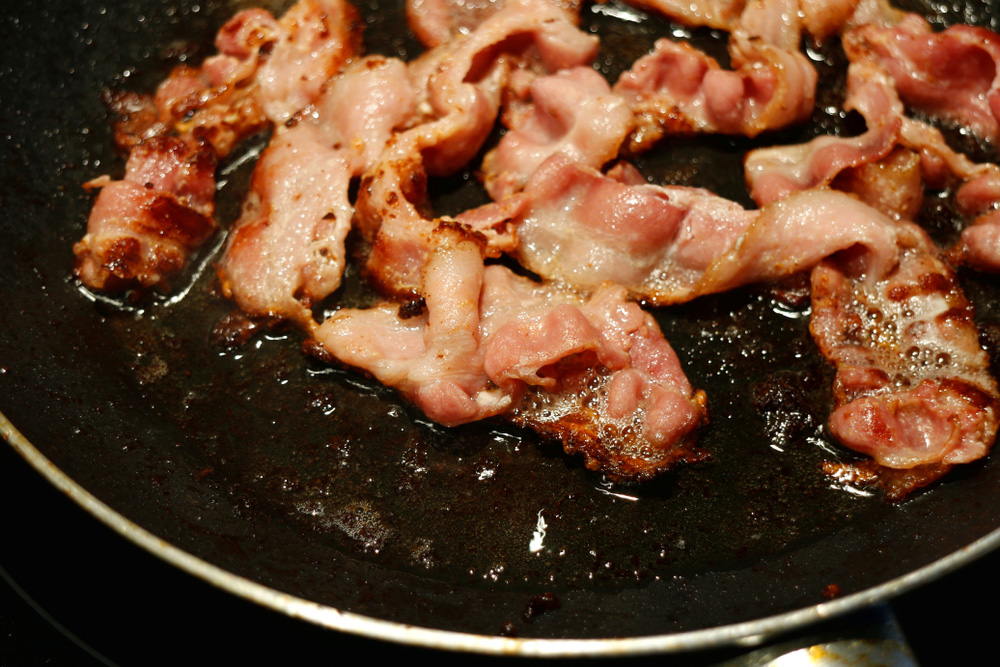When cooking meats like bacon, or sauteing vegetables, grease and cooking oil often find their way down the kitchen sink. The convenience of a pouring bacon grease down the sink conceals the potential havoc it wreaks on plumbing systems. Let’s take a look at the consequences of pouring grease down the drain, or accidentally pouring oil down the drain, and the resulting fatbergs, sewer clogs, and environmental impacts.
What Happens When You Pour Grease Down Your Drain?
Pouring bacon grease down the drain might seem harmless, but when hot, liquid grease is introduced to your plumbing system, it cools and solidifies as it travels through the pipes. Over time, this solidified grease accumulates on the interior walls of the pipes, creating a sticky and stubborn coating. As this process repeats, the buildup becomes a magnet for other debris, forming drain blockages that impede the flow of water.
Fatbergs and Sewer Clogs
The consequences extend beyond your home’s plumbing. Accumulated grease, along with other non-biodegradable items like wipes, contributes to the formation of fatbergs in municipal sewer systems. Fatbergs are monstrous conglomerations of congealed fat, grease, and debris that can grow to astonishing sizes, blocking entire sewer lines. These blockages not only disrupt the proper functioning of sewage systems but also pose significant challenges and expenses for municipalities to remove.
How to Dispose of Cooking Oil and Grease
Can you pour oil down the drain with hot water? No, this is not an effective way to dispose of grease. Below are the best methods to get rid of your grease.
1. Cool and Collect
Allow used cooking oil or grease to cool completely after cooking.
2. Use a Sealable Container
Scrape or scoop the cooled grease into a sealable container, such as an empty glass jar or metal can.
3. Dispose of in the Trash
Once the container is full, securely seal it and dispose of it in the regular trash.
4. Recycle Cooking Oil
Some areas have recycling programs for used cooking oil. Check local guidelines and drop-off locations for proper disposal.
5. Grease Recycling Events
Some communities organize grease recycling events, providing a sustainable solution for disposing of used cooking oil.
What Can I Do If I Already Poured Grease Down The Drain?
1. Boiling Water
Pouring boiling water down the drain can help break down and flush away some grease buildup. Repeat as needed.
2. Baking Soda and Vinegar
Create a mixture of baking soda and vinegar, pour it down the drain, and let it sit for several hours before flushing with hot water.
3. Plunger
For minor blockages, a plunger may help dislodge the obstruction. Ensure there is enough water in the sink or bathtub to cover the plunger.
4. Professional Plumbing Service
If blockages persist or are severe, seek professional plumbing assistance from FORD’S. Our plumbers have specialized tools, such as drain snakes and hydro-jetting equipment, to address stubborn grease clogs effectively.
Contact A Plumber If Your Drain Is Clogged
Responsible grease disposal is a small yet impactful step toward maintaining healthy plumbing and contributing to environmental sustainability. The consequences of pouring grease down the drain extend beyond individual homes, affecting communal sewer systems and the environment at large.
By adopting proper disposal practices and taking corrective measures when needed, we can collectively ensure that our drains remain free-flowing, reducing the risk of clogs, backups, and the formation of menacing fatbergs.
If you have an issue with a clogged drain, be sure to call FORD’S Plumbing and Heating and we can inspect your system. No matter what is needed to resolve your plumbing problems, we have the expertise and tools to get it done right.



















